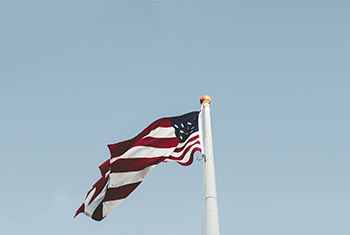'Who is your president?'
On Halloween 2000, I was studying abroad in Spain in an internship program in the Madrid office of Dow Jones Newswires. The morning news on Spanish national television included a clip from The Tonight Show showing George W. Bush donning an Al Gore mask and Jay Leno putting on a mask of Bush.
One of my housemates, a French national, raised his hands in disgust.
“Who cares? What is he going to do about the economy?” Sebastian harrumphed.
Days later, word spread through our flat of expats and study abroad students that the U.S. ambassador to Spain was hosting an election night party at the embassy, and all Americans abroad and close friends were invited. Our merry band of American college kids put on the best outfits we’d brought to Madrid and prepared to celebrate — or boo — the election of the U.S. president.

The ambassador displayed an Old World graciousness unfamiliar to many of us young college students, kissing our hands upon our arrival into the opulent structure. We mingled with other college students, longtime expatriates and reporters from multiple news agencies. As locals had told me, the president of the United States set the tone for the rest of the world. International citizens watched our elections closely, hoping Americans would make a wise choice.
Madrid was six hours ahead of Eastern Standard Time, so it wasn’t until 2 a.m. that we partygoers began seeing election results roll in from the States. We watched as the Eastern seaboard began turning blue while the South went red. There was an audible gasp when Bush won Tennessee over native-son Gore, and Democrats in the audience cheered when Hillary Clinton was announced as New York’s newest senator.
One network announced that Gore had won Florida. Then Florida went back on the board. It was already late and getting later. Democrats and Republicans got into shouting matches. One reporter asked a group of American students in Spanish who they wanted to win, and why.
“Bush es malo, malo, malo,” claimed one girl. “Me gusta Al Gore.”
“Noooo ...” said the guy next to her. “¡Bush es bueno y Gore es malo!”
By 4 a.m. I gave up. I had to be at my office in a few hours.
I hopped in a cab. The driver asked me in Spanish who won.
“No sé,” I answered, then proceeded to explain how Florida was still in dispute. He was stunned but proceeded to ask about other American elections during the 20-minute drive. He asked me to explain one U.S. Senate race where he heard a dead man had beaten a live candidate.
“How can a dead guy run for office?”
This cabdriver, halfway around the world, knew about the Missouri race, in which the Democrat, then-governor Mel Carnahan, died in a plane crash barely a month before the election. His name wasn’t removed from the ballot, and he posthumously got more votes than Republican incumbent John Ashcroft. I was amazed at how much news of American elections spread overseas, and how quickly.
At the same time, I felt embarrassed about how little I had known about the world.
After just two hours of sleep, I woke up to hear there were no final election results.
The United States wouldn’t have a president for another few weeks. I wondered if I’d soon be witnessing the collapse of my home country from afar. What type of nation would I be returning to in December? What if this election fiasco became the thing that finally ended the Great American Experiment in Democracy and led us to anarchy and martial law? Today those thoughts seem extreme, but at the time, I didn’t know what to think.
As I continued to work and travel across Europe, the election remained a popular topic. “Who is your president?” asked a Portuguese shopkeeper when she learned I was from the United States. Yes, hanging chads were front-page news in Portugal, and the decisive Supreme Court case led the news in Switzerland.
We all know the result. The country didn’t collapse. The Great American Experiment in Democracy survived.